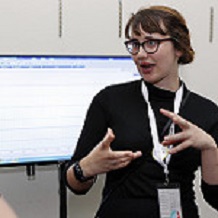
Sophie Meekings
Royal Society Dorothy Hodgkin Research Fellow
Profile
Biography
- British Academy Postdoctoral Fellow, Newcastle University (2017-2021)
- PhD Cognitive Neuroscience, University College London (2017)
- MSc Language Sciences, University College London (2013)
- BA (Hons) Linguistics, Newcastle University (2011)
Career
I'm a postdoctoral researcher trying to figure out how human voices work.
The big questions I'm interested in are:
- How do we control our voices?
- How much control do we have over our voices?
- How are our voices influenced by social context?
- How does your voice relate to your sense of identity?
- How is this different in typical speakers and people who have a neurological condition that affects their speech, like stammering, stroke, or Tourettes' Syndrome?
My research attempts to address these questions by looking at the acoustics of how people change their voices in different situations, and how this is related to brain activation, as well as more subjective things like feelings of agency and affiliation.
Research
Overview
Talking humans in a social world: communicative modulation of fluent and dysfluent speech production.
Projects
For most of us, our voices are one of the major ways in which we navigate daily life— it’s how we communicate, and we judge other people based on how they speak to us. For some people, having a chat with the barista is a perk of getting their morning coffee. For others, especially those with speech production difficulties such as stuttering, it might be a source of frustration. Either way, all over the world, speaking to other humans is a core part of human interaction. Yet when scientists try to understand how the brain helps or hinders us from talking, their experiments often involve people talking on their own in a quiet room, devoid of distraction.
I want to understand how the brain produces everyday conversational interactions in neurotypical talkers and people who stutter. I also want to understand why people stutter, and how having a stutter affects everyday interactions and employment outcomes. Work on stuttering is mainly based on data from Western populations so I’ll be expanding that research by working with people who live in Mysore, India, whose native language has a different structure to English. And I will use fNIRS, a technique that can track brain activation in two people at once while they talk to each other, to look at the brain basis of speech in real-world contexts.
I hope this work will help us understand how speech production works in the real world, for people who are fluent and people who aren’t.
Research group(s)
- Speech Lab
Grants
- 2021: Royal Society Dorothy Hodgkin Research Fellowship- £575,989.30
- 2019: British Academy Global Talent Fund research and dissemination grant- £2205
- 2018: British Academy Postdoctoral Fellowship- £332,145.
- 2017: Newcastle University Research Excellence Academy- £120,000; Newcastle University Faculty Research Fund- £3000
- 2013: ESRC PhD studentship- c. £60,000
Collaborators
- Professor Sven Mattys
Publications
Selected publications
- Meekings, S. (accepted). Turn that down, I can’t hear myself think! How our brains deal with talking in noisy environments. Frontiers for Young Minds
- Schalz, S., Meekings, S., and Dickins, T. E. (2021) Humans Discriminate Individual Large-Billed Crows and Individual Cats by Their Respective Vocalizations. International Journal of Comparative Psychology, 33
- Meekings, S., and Scott, S.K. (2021). Error in the superior temporal gyrus? A systematic review and ALE meta-analysis of speech production studies. Journal of Cognitive Neuroscience, 33:422-444
- Meekings, S., Evans, S., Lavan, N., Boebinger, D., Krieger-Redwood, K., Cooke, M., Scott, S. K. (2016). Distinct neural systems recruited when speech production is modulated by different masking sounds. Journal of the Acoustical Society of America, 140:8-19

